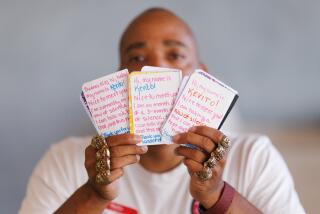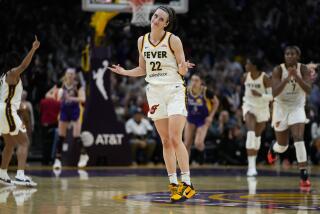‘It’s amazing what little things you can do to make an impression on these kids’
It’s something akin to love that makes Monroe (Bookie) Clark spend most of his time and energy volunteering at his alma mater, Hoover High School. While he could be quietly enjoying his retirement from the insurance business, the 64-year-old Talmadge resident is instead “getting pumped up,” calling out the scores at the school’s basketball games, or helping a foreign student learn to read, or ferrying a teen-ager to and from a summer job. Clark, who graduated from Hoover in 1943, insists he’s just doing what anyone could do if they had the time. He says it’s astonishing what a difference volunteering a couple of hours a week can make. Times staff writer Caroline Lemke interviewed Clark, and Bob Grieser photographed him.
I was born and raised here in San Diego. When I was 9 years old, my folks built a home out in Talmadge, and I’ve lived there ever since. In fact, I don’t think there’s anybody who’s lived in their house continuously like I have since 1936.
I had polio as a kid. I walked better then than I do now. I went to Woodrow Wilson Junior High, and I thought I had died and gone to heaven. They usually wouldn’t let handicapped kids go to public school. In those days, they didn’t have any facilities. Someone on crutches, well, you never saw anybody on crutches.
If you were handicapped in those days, in the ‘30s, they had a school called the Sunshine School you went to.
My first exposure to regular school was at Sacred Heart Grammar School. I went there in sixth grade. Then the next year, the principal at Woodrow Wilson said, “Hey, we’ll take Monroe in.” My folks had to sign a waiver in case I got hurt. I was the only crippled kid in the school.
And then I went to Hoover. That really expanded my getting around and doing things. In those days, in 1940, Hoover was one of only two highs schools. Hoover was the focal point of everything out there in East San Diego.
The war was on. Everybody had this great feeling for their country, their school, everything. When I went to Hoover, there were only two black kids, and one Japanese boy, and I can’t remember any Mexicans. We had a lot of loyalty; there was no race prejudice there.
I’ve only really been volunteering probably less than a year, but through the Kiwanis Club I’ve been involved in Hoover since 1953. The Kiwanis sponsor the Key Club at school, and we sold things at the football games. Now, I announce the basketball games, and I love it! It’s fun being around the kids.
I started thinking, “What can an individual do?” A teacher at Hoover said to me, ‘Well, Bookie, you ought to come over here and get involved in our computer lab.’ When I went in there, there was this little girl sitting there, reading with the help of a teacher’s aide. I said, ‘How could a clown like me help a young girl like that to read?’
The teacher said, ‘Just give me two hours.’ I like a challenge. I said, ‘You’re on.’ Now, a couple hours a week isn’t enough for me. I go in, and by the end of the day, I am so pumped up. It’s exciting that a fourth-grade Vietnamese girl wants to read to me.
I see a great need for the community to get involved and do things. Why don’t people who are sitting around volunteer a couple of hours a week at a school? Anybody could help. If a person would get involved, it’s extremely interesting.
The thing I’m interested in is getting other Hoover people to do little things. It’s amazing what little things you can do to make an impression on these kids.
I have a ton of friends who are getting ready to retire and are bored with life. I’m so doggone busy. . . . I consider myself the luckiest guy in the whole world. I can’t walk nearly as good as I walked five years ago, and I feel like I’m doing 10 times as much as I did five years ago.
More to Read
Sign up for our Book Club newsletter
Get the latest news, events and more from the Los Angeles Times Book Club, and help us get L.A. reading and talking.
You may occasionally receive promotional content from the Los Angeles Times.






